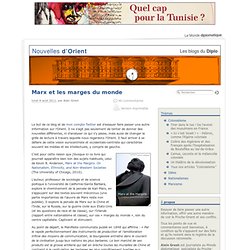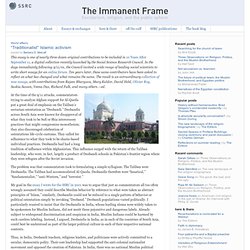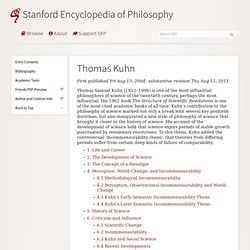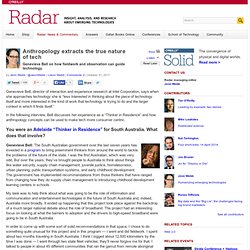

#Mimesis Concepts - 02AnthropPhilos01 - 201108. #humsci #Humanism 02myAnthropPhilos_201108_no01. Marx et les marges du monde. Marx et les marges du monde. Le but de ce blog et de mon compte Twitter est d’essayer faire passer une autre information sur l’Orient.

Il ne s’agit pas seulement de tenter de donner des nouvelles différentes, ni d’analyser ce qui s’y passe, mais aussi de changer la grille de lecture à travers laquelle nous regardons l’Orient. Il faut arriver à se défaire de cette vision eurocentriste et occidentalo-centriste qui caractérise souvent les médias et les intellectuels, y compris de gauche. C’est pour cette raison que j’évoque ici ce livre qui pourrait apparaître bien loin des sujets habituels, celui de Kevin B.
Anderson, Marx at the Margins. Robert Brandom: Teaching and Research Materials - 2011 Munich Hegel Lectures. Robert Brandom: Teaching and Research Materials 2011 Munich Hegel Lectures Knowing and Representing: Reading (between the lines of) Hegel’s Introduction The 2011 Munich Hegel Lectures The lectures were given 30 May - 1 June, 2011, at Ludwig-Maximilians-Universität.

Lecture One, "Conceptual Realism and the Semantic Possibility of Knowledge":Handout,Text Lecture Two, "Representation and the Experience of Error: A Functionalist Approach to the Distinction between Appearance and Reality":Handout,Text Lecture Three, "Following the Path of Despair to a Bacchanalian Revel: The Emergence of the Second, True, Object":Handout,Text. Robert Brandom. Philosophie: Wir sind dreifach frei. -----------------------------quotation added by oAnth Für Honneth ist die entscheidende Wertvoraussetzung der Moderne die Freiheit in drei Bedeutungen: als gleiches Recht eines jeden Menschen auf bestimmte Grundrechte, als Anspruch auf das eigene autonome Urteil über moralische Normen und als »soziale Freiheit«.

Philosophie: Wir sind dreifach frei. Dem Frankfurter Philosophen Axel Honneth ist mit seinem neuen Buch »Das Recht der Freiheit« ein Kunststück geglückt: Er zeigt, dass im alten Hegel ein aktueller Kritiker unserer modernen Gesellschaften steckt.

Speichern Drucken Twitter Facebook. Concrete rules, differences & equivalences (#ranciere - preface from 2010 ...) Sdv_duras: #ranciere - preface from 2... De hominis dignitate - Pico - #Humanism - 02myItRenHum_201108_01. "There is a clear and reasonably uncontroversial basis for a simple theory of ..." Global justice. The Immanent Frame - Barbara D. Metcalf - 2011-09-07. “Traditionalist” Islamic activism. This essay is one of nearly three dozen original contributions to be included in 10 Years After September 11, a digital collection recently launched by the Social Science Research Council.

In the days immediately following 9/11/01, the Council invited a wide range of leading social scientists to write short essays for an online forum. Ten years later, these same contributors have been asked to reflect on what has changed and what remains the same. The result is an extraordinary collection of new essays, with contributions from Rajeev Bhargava, Mary Kaldor, David Held, Olivier Roy, Saskia Sassen, Veena Das, Richard Falk, and many others. —ed. At the time of the 9/11 attacks, commentators trying to analyze Afghan support for Al-Qaeda put a great deal of emphasis on the Taliban’s sectarian orientation as “Deobandi.” The problem was that commentators took to formulating a simple syllogism: The Taliban were Deobandis. Risk. Risk. Second-order simulacra - Wikipedia. Second-order simulacra. Part of the three order simulacra, the Second-order simulacra, a term coined by Jean Baudrillard, are symbols of a non faithful representation to the original.
Here, signs and images do not faithfully show us reality, but might hint at the existence of something real which the sign itself is incapable of encapsulating.[1] While the first-order simulacra is a faithful copy to the original and the third order are symbols that have become without referents, that is, symbols with no real object to represent but pretends to be a faithful copy of an original. Simply put, a third-order simulacra are symbols in themselves taken for reality and further layer of symbolism is added. This occurs when the symbol is taken to be more important or authoritative of the original entity, authenticity has been replaced by copy (thus reality is replaced by a substitute).
References[edit] Jump up ^ Baudrillard 1994 [1981], Simulacra and Simulation, University of Michigan Press, p.6 See also[edit] "On Glocalization coming of Age" by Zygmunt Bauman. One is tempted to say: social inventions or re-inventions (as the newly invented/discovered possibility of restoring to the city square the ancient role of the agora on which rules and rulers were...

Stripping the place of its importance means that no place can any longer consider its own plight and potency, fullness or void, dramas played in and spectators they attract, as its private mattes. Places may (and do) propose, but it is now the turn of the unknown/uncontrolled/intractable/unpredictable forces roaming in the “space of flows” to dispose. Initiatives are as before local, but their consequences are now global, staying stubbornly beyond the predicting/planning/steering powers of the initiative’s birthplace, or any other place for that matter.
On Glocalization coming of Age. Causal-mechanisms theory in Europe. Causal-mechanisms theory in Europe. The causal-mechanisms theory of social explanation has been influential throughout an extensive network of European philosophers and social scientists, often with a pretty direct connection to the analytical sociology research programme.

Peter Hedstrom and his research network are particularly influential in this spread of ideas. It is worth mentioning a couple of books in the past ten years that have brought this approach to non-English speakers. Philosopher Michael Schmid published Die Logik mechanismischer Erklärungen. Thomas Kuhn. Thomas Kuhn. First published Fri Aug 13, 2004; substantive revision Thu Aug 11, 2011.

Métamorphoses de l’idée d’empire à la Renaissance. Thierry Ménissier. Anthropology extracts the true nature of tech. Genevieve Bell, director of interaction and experience research at Intel Corporation, says when she approaches technology she is "less interested in thinking about the piece of technology itself and more interested in the kind of work that technology is trying to do and the larger context in which it finds itself.

" In the following interview, Bell discusses her experience as a "Thinker in Residence" and how anthropology concepts can be used to make tech more consumer centric. You were an Adelaide "Thinker in Residence" for South Australia. What does that involve? Genevieve Bell: The South Australian government over the last seven years has invested in a program to bring preeminent thinkers from around the world to tackle the problems of the future of the state. I was the first Australian, which was very odd.
Anthropology extracts the true nature of tech. Genevieve Bell, director of interaction and experience research at Intel Corporation, says when she approaches technology she is “less interested in thinking about the piece of technology itself and more interested in the kind of work that technology is trying to do and the larger context in which it finds itself.”

In the following interview, Bell discusses her experience as a “Thinker in Residence” and how anthropology concepts can be used to make tech more consumer centric.